RFS Briefings - May 25, 2021
Dear Colleagues,
I am pleased to include another issue of RFS Briefings with some timely and encouraging updates on women in science.
A few highlights to focus on here include upcoming events and awards:
- The past year has witnessed seismic shifts in many aspects of science, including the 2020 Nobel Prize in Chemistry awarded to Professors Jennifer Doudna, PhD, and Emmanuelle Charpentier, PhD, for their discovery of CRISPR, transforming the landscape of gene therapy forever. As women gene therapy scientists see the truly limitless possibilities, we highlight a new issue of Human Gene Therapy on the occasion of the 2021 American Society for Gene and Cell Therapy Annual Meeting. The issue highlights several outstanding women scientists who lead gene therapy science today. Read more.
-
Congratulations to Raven Baxter, past RFS speaker, member of our Advisory Board, molecular biologist, science communicator, and recipient of the SUNY Chancellor's Award for Student Excellence - Special Service (COVID-19). Read more.
-
Apply now for the 2022 Vilcek Prizes for Creative Promise in Biomedical Science. The Vilcek Foundation will award three Creative Promise Prizes of $50,000 each to young, immigrant biomedical scientists who have demonstrated exceptional achievements early in their careers. Applications are open through June 11, 2021. Read more.
-
Register now for “Nutrition and the Brain (From Research to Practice), Thursday, June 10, 2021” with Mary Yannakoulia, PhD, Professor of Nutrition and Eating Behavior at Harokopio University. Read more.
See below for more news about women in science
Please continue to share important news and opportunities with us so that we may share it with you, and others who are committed to supporting the careers of exceptional women in science.
Stay safe and sound,
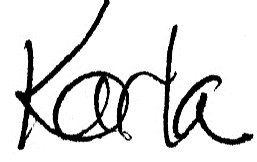
Karla Shepard Rubinger
Executive Director
Rosalind Franklin Society
www.rosalindfranklinsociety.org
Doudna and Arnold chat “Nobel to Nobel”
During the “Nobel to Nobel” discussion during the Spark 2021 conference, hosted by Illumina, Jennifer Doudna and Frances Arnold talked about CRISPR, the ethics of genome editing, working on COVID-19, starting companies, and winning the Nobel. But it was during their conversations about being women in science, and their stories of clearing hurdles to achieve extreme success, where their wisdom held the most inspiration. You can also view the GEN/RFS webinar featuring Dr. Doudna on our website. Read more.
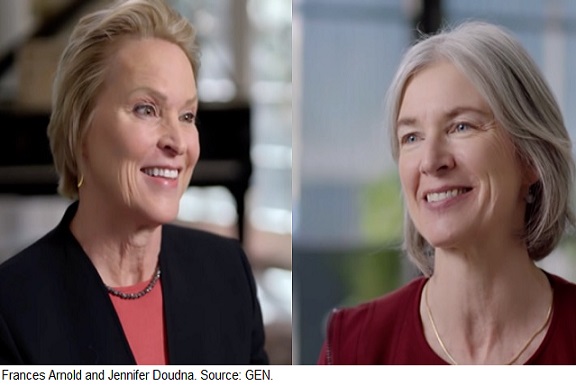
Rita R. Colwell Impact Fund launched to support women in science.
In Japan, fewer than 20% of researchers are women. To help lessen this gap, the OIST Foundation, a New York-based not-for-profit organization, in partnership with the Okinawa Institute of Science and Technology Graduate University (OIST), launched the Rita R. Colwell Impact Fund for the Advancement of Women in Science on May 19th 2021. Dr. Rita Colwell, president of RFS, was the first woman to serve as the Director of the United States National Science Foundation from 1998 to 2004, and she is a Distinguished Professor at the University of Maryland, College Park and the Johns Hopkins University Bloomberg School of Public Health. Read more.
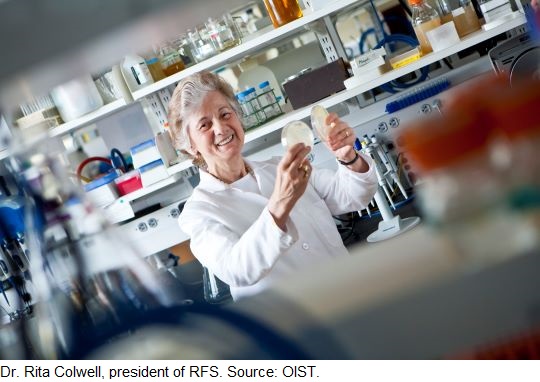
Tory Burch and Nobel Prize winner Jennifer Doudna are teaming up to help women scientists.
Tory Burch and Jennifer Doudna have teamed up to create the Tory Burch Fellowship at the Innovative Genomics Institute, a one-year program to support a female founder leading a business in genomics. Burch and Doudna spoke exclusively with Fast Company about the fellowship and its first recipient, Nabiha Saklayen, cofounder of Cambridge, Massachusetts-based Cellino. Read more.
Editorial: Opening the path to biotech.
In an editorial for Science, Sangeeta Bhatia, Nancy Hopkins, and Susan Hockfield of MIT discuss a study released last month by MIT members of the Boston Biotech Working Group (BBWG) which documents a problem at the interface of academia and industry: Fewer women than men faculty at MIT move their research discoveries into companies, and fewer serve as scientific advisers or on boards of directors. This disparity holds back women faculty and denies the full promise of innovation to the universities they work for, the biotech industry, and society at large. Read more.
Leading coronavirus scientist, Kizzmekia S. Corbett, to join Harvard T.H. Chan School of Public Health to continue vaccine development research.
Harvard T.H. Chan School of Public Health announced that Kizzmekia S. Corbett will join the School as an assistant professor in the Department of Immunology and Infectious Diseases. Corbett was instrumental in groundbreaking research that directly led to development of the Moderna COVID-19 vaccine. She comes to Harvard Chan School following more than six years as a research fellow at the National Institute of Allergy and Infectious Diseases’ (NIAID) Vaccine Research Center, part of the National Institutes of Health (NIH). Read more.
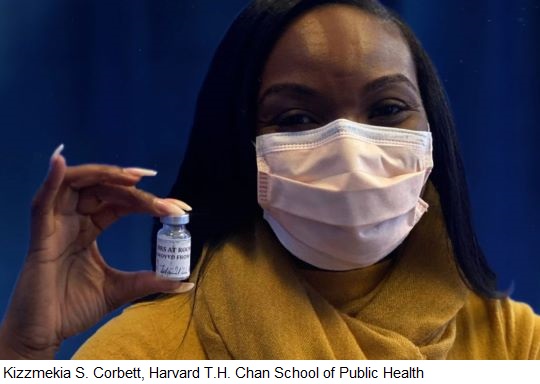
‘Long COVID’ study will examine vaccines’ effect on patient symptoms.
HHMI Investigator Akiko Iwasaki's team has launched a new study to examine how COVID-19 vaccination affects people with long COVID. Prof. Akiko, who was a speaker at our recent conference in December, will work with her team to collect blood and saliva samples before and after vaccination and look at participants’ immune responses. That could tell researchers what’s driving long COVID, and even suggest therapies likely to treat it. Read more.
The US Mint wants you to help choose the pioneering women that will appear on its new quarters.
The American Women Quarters Program is a four-year program that celebrates the accomplishments and contributions made by women to the development and history of the United States. Beginning in 2022, and continuing through 2025, the U.S. Mint will issue up to five new reverse designs each year. The National Women's History Museum welcomes entries of women known for their work in civil rights, science, the arts and abolition, among other areas, with an emphasis on women from "ethnically, racially and geographically diverse backgrounds," according to the US Mint. Read more.
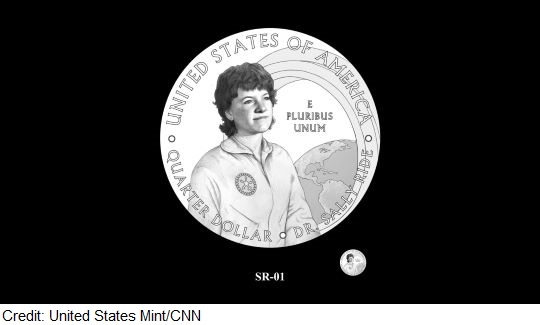
Women scientists launch ‘Science Moms,’ a climate campaign aimed at mothers.
“We know that climate change is a threat to all people, and in particular our kids,” says Melissa Burt, a climate scientist at Colorado State University. She says that although many moms are worried about global warming, many do not feel equipped to take action. So Burt and a group of other women scientists teamed up to create a campaign called Science Moms. On its website, the Science Moms group provides short videos, debunks climate myths and offers ways to get involved. Read more.
Book review: An incomparable intellectual who fell through the cracks of history.
Michelle DiMeo has produced a portrait of an influential female thinker who has been hiding in plain sight — as a footnote in the story of her more famous brother, chemist and Royal Society co-founder Robert Boyle. In a new book, DiMeo reveals Katherine Jones, Lady Ranelagh, as central to political, religious, philosophical and medical discussions, yet destined to be forgotten, because she obeyed the convention that women should not put their thoughts into print. Read more.
Commentary: An update on gender parity trends for invited speakers at four prominent virology conference series.
Historically, men rather than women have been selected for invited speaking positions at the four prominent virology conference series that Ann C. Palmenberg and Robert F. Kalejta have followed since the 1980s. However, the low ratio of female representation in most earlier years (20% in 1982 to 2010) has shown encouraging improvement (37% in 2011 to 2017), particularly over the last few years (48% in 2018 to 2020). Here, Palmenberg and Kalejta describe this promising rise in inclusion and discuss factors that may help perpetuate and extend this overdue transformation toward gender parity. Read more.
Join us on Thursday, June 10 at 2 PM EDT(UTC-4) for the latest advances in nutrition and brain health.
Mary Yannakoulia, Professor of Nutrition and Eating Behavior at Harokopio University, will be speaking at the event. Dr. Yannakoulia’s research focuses on eating behavior, nutrition and lifestyle interventions and nutrition and aging. Read more.
Latin America's female scientists pack a big punch despite glass ceiling.
A report by UNESCO and UN Women shows they account for 45% of female researchers in Latin America and the Caribbean, compared with around 29% globally, the highest anywhere in the world, although there are still gaps in some specialties. Experts say that more public policies, business incentives and changes in the education system are needed. Read more.
Pandemic could roll back advancements for women in STEMM.
Many women in science careers faced difficulties during the pandemic that may set back their careers. A new report by The National Academies of Science, Engineering, and Medicine suggests ways that universities and other institutions should make sure they keep women in those fields. Short Wave reporter Emily Kwong spoke with Dr. Eve Higginbotham about our earliest understandings of how the pandemic has impacted the careers of women in STEMM, and what support institutions can offer. Read more.
Marianna Limas, Social Media Manager
Nilda Rivera, Partnership and Events Manager
|




